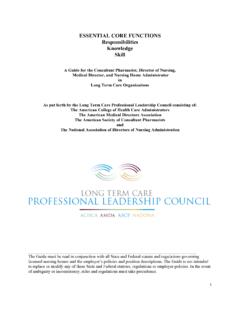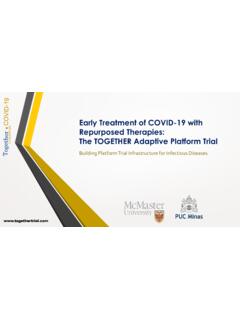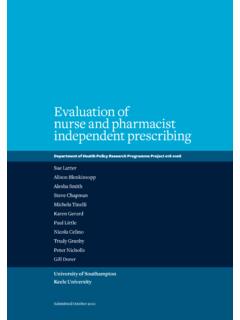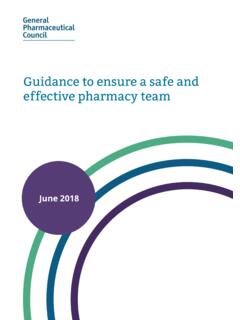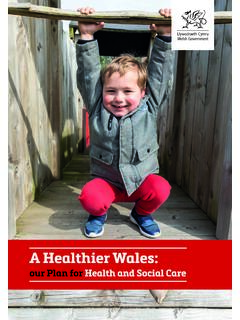Transcription of Operational productivity and performance in English NHS ...
1 February 2016 February 2016 Operational productivity and performance in English NHS acute hospitals: Unwarranted variations An independent report for the Department of Health by Lord Carter of Coles February 2016 Operational productivity and performance in English NHS acute hospitals: Unwarranted variations An independent report for the Department of Health by Lord Carter of Coles 2 Unwarranted variationsThanks and acknowledgements The help we received from organisations and individuals are too numerous to list, but I would particularly like to thank NHS Procurement and Efficiency board members for the steer they gave us over the last 18 months.
2 Sir Robert Naylor, Sir Ian Carruthers, Derek Sach, Sir Michael Rawlins, Tony Whitfield, Tony McCarthy, Mandie Sunderland, Catherine Frances, Giles Denham, Liz Woodeson, Peter Smith, Bill Crothers, Julian Kelly, and Keith Ridge. I would also like to thank all of the senior executives and non-executives from the 32 trusts who worked closely with us, and all of their staff including directors of nursing, chief pharmacists, operations directors, directors of estates, heads of procurement, pathologists, radiologists, and of course finance directors who acted as the main link between us.
3 Their time and knowledge during a difficult year for the NHS is very much appreciated. There are also many organisations that have been helpful and supportive including the Royal Colleges of Nursing, Surgeons, Pathologists and Radiologists, and the many Associations we have worked with such as Clinical Pathologists, the British In Vitro Diagnostics Association, Healthcare Supply Association, and the Association of British Healthcare Industries. I would also like to thank Chris Hopson (NHS Providers), Rob Webster (NHS Confederation) and Professor Chris Ham (Kings Fund).
4 I am also grateful for the time given to me and the team by the main health organisations such as NHS England, NHS Improvement and the Care Quality Commission. I am sure the guidance we received from David Behan, Professor Mike Richards, Simon Stevens, Jim Mackey, Ed Smith, and their teams will ensure the recommendations in this report get implemented. This also applies to the many civil servants in the Department of Health, the Cabinet Office and Her Majesty s Treasury. We have also received help and guidance from overseas, giving us valuable international comparisons from organisations such as the Hospital Corporation of America, the Tenet Group, Virginia Mason, the National Health performance Authority in Australia, and Netcare in South would also like to thank the many companies who provide services to the NHS for information they gave us for this review, including Accenture, Allocate, Health Logistics, Bravo, amongst others.
5 Finally I would also like to thank Professor Tim Briggs, Professor Tim Evans for their clinical insights, Lyn McIntyre MBE for her nursing knowledge and perseverance and of course my team whose passion and dedication have been unwavering. I am sure there are many people and organisations I have not mentioned above but I would personally like to thank everyone who has helped me and my team to compile this variationsTo Secretary of State for Health In June 2014 you asked me to look at what could be done to improve efficiency in hospitals in England and in my interim report of June last year I described the widely varying resource utilisation across the NHS.
6 I estimated that if we reduced unwarranted variation at least 5bn of the spent annually by acute hospitals could be saved. Further to my letter of 14th January 2015, I am now submitting to you my final report which details how these efficiencies can be achieved between now and June 2015 I have engaged with 136 acute hospitals in England to share with them specific areas where their data indicates they could reduce variation relative to the NHS average or their peers. I have personally visited nearly 40 of these hospitals around a third of all acute spend to hear first-hand the challenges they face in delivering improved productivity and making efficiency savings.
7 The value in meeting senior executives face-to-face cannot be overstated, and in the great majority of cases I have been impressed by the dedication and commitment shown by senior executives and their boards in facing up to the said in my interim report that the NHS has some of the best hospitals in the world, in terms of both quality and efficiency and everywhere we looked there was always a hospital doing something exceptional; however, it is apparent that most trusts need help and support if the 5bn of efficiency is to be realised over the next three to four years.
8 Given this challenge there are five points from my report I wish to highlight. Firstly, my experience of the best of the NHS and other health care systems internationally shows that the provision of high quality clinical care and good resource management go hand-in-hand. All trusts should therefore grasp the use of their resources more effectively, the most important of which is their people. I have set out in my report where and how this clinical and administrative management grip should be focussed. Secondly, a single reporting framework should be adopted across all trusts, which pulls together clinical quality and resource performance data and compares it to the best in class.
9 This constant analysis of performance for trusts, commissioners and regulators will identify areas of variation (good and bad) that they need to improve. The framework will also help trust boards hold their executive teams to account. However, there must be only one version of the truth that everybody, locally and nationally, will use to drive improvements, so we must endeavour to reduce and rationalise the plethora of reporting burdens currently placed on providers by commissioners and mandates on-going development of the NHS model hospital.
10 Leading international healthcare systems have a clear, consistent approach to monitoring and managing the performance of their hospitals against expected standards of service and efficiency. Key performance metrics are rigorously benchmarked against plans and peer performance to a regular reporting cycle, daily, weekly and third point relates to delayed transfers of care for patients out of the acute hospital setting. Nearly all trusts wrestle with the problem of moving those who are medically fit into settings that are more appropriate for the delivery of their care or rehabilitation, and for the families and carers.










